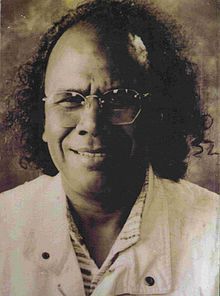Ram Dayal Munda
| Ram Dayal Munda | |
|---|---|

Dr Ram Dayal Munda
|
|
| Born | 23 August 1939 Diuri village, Ranchi, Jharkhand, India |
| Died | 30 September 2011 |
| Cause of death | Prostate Cancer |
| Resting place | Diuri village, Tamar, Ranchi, Jharkhand 23.046 N, 85.680 E |
| Monuments |
Dr Ram Dayal Munda Park, Morabadi, Ranchi Dr Ram Dayal Munda Rajkiya Kala Bhawan, Hotwar, Ranchi Dr Ram Dayal Munda Tribal Welfare Research Institute, Morabadi, Ranchi Dr Ram Dayal Munda Akhra, Department of Tribal and Regional Languages, Ranchi University Dr Ram Dayal Munda Central Library, Indira Gandhi National Tribal University, Amarkantak |
| Nationality | Indian |
| Education |
Lutheran Mission School, Amlesa, Tamar, Ranchi, 1946–53 S.S. High School, Khunti, Jharkhand, 1953–57 Ranchi University, Ranchi, 1957–63, M.A. (Anthropology) University of Chicago, USA, 1963–70, M.A. (Linguistics) |
| Alma mater | Ranchi University, University of Chicago |
| Occupation | Anthropologist, Linguist, Folklorist, Music Exponent, Academician, Agriculturalist, Vice-Chancellor, |
| Organization | Indian Confederation of Indigenous and Tribal Peoples (ICITP) |
| Known for |
Work on Indian Languages and Literature Re-constructing and popularizing the philosophical basis of Adi Dharam: the religious beliefs of the tribals of India Contribution in Jharkhand Movement. Pioneer of Cultural Reawakening Movement among the Indigenous People. Contribution in establishing the Department of Tribal and Regional Languages, Ranchi University Starting and establishing the Sarhul (Indigenous Peoples' New Year) cultural procession |
| Notable work |
Adi-Dharam: Religious Beliefs of the Adivasis of India Aspects of Mundari Verb Mundari Vyakaran (Mundari Grammar) Seled (Poems in Mundari, Nagpuri and Hindi) Hisir (Modern Mundari Songs) Shri Budu Babu aur Unki Rachnae The Sun Charioteer, English translation of Ramdhari Singh DInkar's Rashmirathi (with Paul Staneslow and David Nelson) Language of Poetry |
| Movement |
The Jharkhand Movement Cultural Reawakening Movement |
| Awards | Padma Shri, Sangeet Natak Akademi Award |
| Signature | |
 |
|
Dr Ram Dayal Munda Park, Morabadi, Ranchi
Dr Ram Dayal Munda Rajkiya Kala Bhawan, Hotwar, Ranchi
Dr Ram Dayal Munda Tribal Welfare Research Institute, Morabadi, Ranchi
Dr Ram Dayal Munda Akhra, Department of Tribal and Regional Languages, Ranchi University
Lutheran Mission School, Amlesa, Tamar, Ranchi, 1946–53
S.S. High School, Khunti, Jharkhand, 1953–57
Ranchi University, Ranchi, 1957–63, M.A. (Anthropology)
Work on Indian Languages and Literature
Re-constructing and popularizing the philosophical basis of Adi Dharam: the religious beliefs of the tribals of India
Contribution in Jharkhand Movement.
Pioneer of Cultural Reawakening Movement among the Indigenous People.
Contribution in establishing the Department of Tribal and Regional Languages, Ranchi University
Adi-Dharam: Religious Beliefs of the Adivasis of India
Aspects of Mundari Verb
Mundari Vyakaran (Mundari Grammar)
Seled (Poems in Mundari, Nagpuri and Hindi)
Hisir (Modern Mundari Songs)
Shri Budu Babu aur Unki Rachnae
The Sun Charioteer, English translation of Ramdhari Singh DInkar's Rashmirathi (with Paul Staneslow and David Nelson)
The Jharkhand Movement
Ram Dayal Munda (23 August 1939 – 30 September 2011), known as R. D. Munda, was an Indian scholar and regional music exponent. He was awarded the Padma Shri of the year 2010 for his contribution to the field of art.
He was a vice-chancellor of Ranchi University and a member of the upper house of the Indian Parliament. In 2007, he received the Sangeet Natak Akademi Award. He died in Ranchi on 30 September 2011.
Munda was born in the tribal village Diuri in the Ranchi district of Jharkhand, India. Munda got his primary education at the Luther Mission School in Amlesa. He obtained his secondary education in the sub divisional town of Khunti. As the heartland of the historic Birsa Movement for autonomy in the British Empire, the Khunti area attracted scholars from all over the world, particularly from the discipline of anthropology. Munda, along with his other friends, often acted as guide to the distinguished visitors this formed the basis for developing of his experiential world. Opting for anthropology as his subject for higher education with a focus on linguistics opened an altogether new world.
...
Wikipedia
